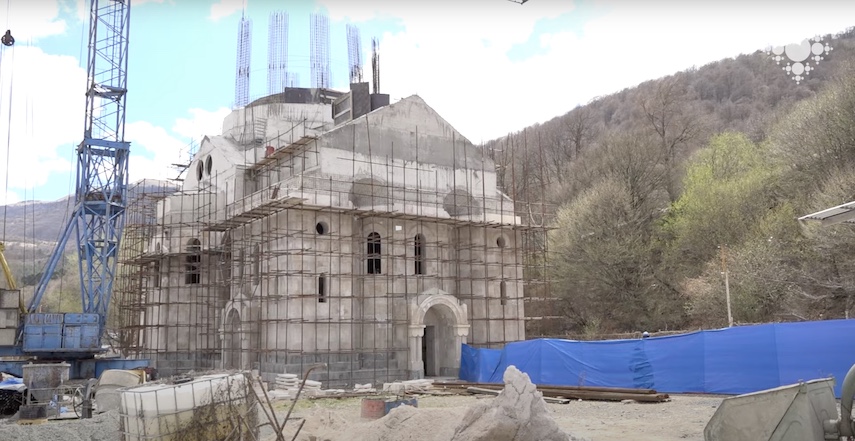The construction of a new church in Dilijan, Armenia—launched in 2019 by philanthropist Ruben Vardanyan—has resumed this spring with renewed momentum, despite Vardanyan’s ongoing imprisonment in Baku. The project continues with the support of the Mother See of Holy Etchmiadzin and the Dilijan Municipality, underscoring its significance as both a spiritual and symbolic endeavor for the Armenian people.
Historically, Dilijan was home to five churches, all of which were destroyed over time. Today, church services are held in a temporary space within the Tufenkian Old Dilijan hotel complex, made possible through the support of James Tufenkian and the unwavering dedication of the community’s spiritual shepherd, Father Shavarsh.
The design for this large church was created by renowned St. Petersburg architect Maxim Atayants, who generously donated the project in support of the initiative.
The church is being built in the style of a domed basilica, characteristic of medieval Armenian architecture, using local travertine stone. Standing 37 meters tall with a total area of 375 square meters, it will accommodate over 300 people. The facade will be adorned with letters of the Armenian alphabet and biblical texts encircling the structure. Completion is planned for 2028.
The founding benefactors of the church construction project are Ruben Vardanyan and his wife, Veronika Zonabend, along with Noubar and Anna Afeyan. In addition, anyone who wishes to contribute can support the creation of Dilijan’s spiritual center by making a donation through the project’s official website.
“From the very beginning of the initiative, Ruben Vardanyan emphasized that the church should be built collectively, so it would not be associated with any single name, but become a place of prayer for all,” said project manager Artur Amirkhanyan. “Through the dedicated website, people from around the world can symbolically ‘buy a stone’ and contribute to the construction of the church.”
He noted, however, that the main donor’s imprisonment in Baku has slightly slowed the progress of construction. Nevertheless, Ruben Vardanyan’s wife, Veronika Zonabend, has recently taken up the initiative, launching a fundraising campaign and directing the proceeds toward the continued building of the church.
“In this situation, the project takes on a special significance. The church is not merely a beautiful architectural structure—it is being built as a symbol of faith, hope, resilience in the face of hardship, and spiritual rebirth,” added Artur Amirkhanyan. “Its construction is, in many ways, also a prayer for the return of Ruben Vardanyan and all other Armenian prisoners [in Azerbaijan].”


